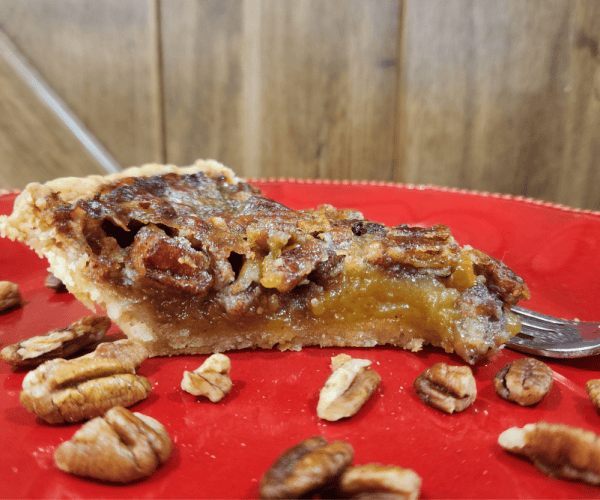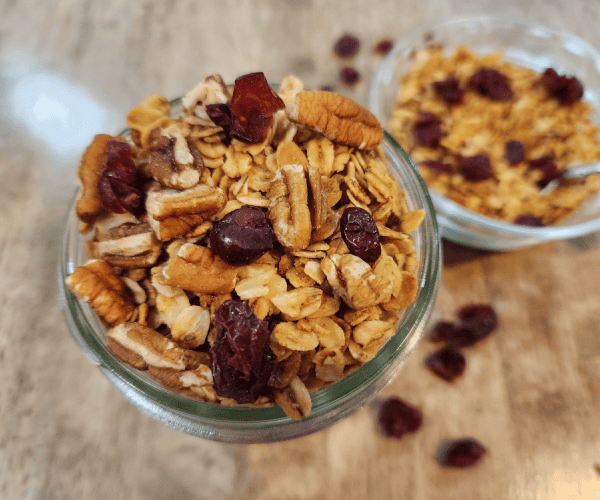Watching Yellowstone TV series have you dreaming of being a cowboy? Love the idea of working outside, as a ranch hand? Whatever your future plans, it all starts with getting that first job and starting to gain farm work experience. We have hired a fair amount of farm help, trained three of our own kids, and I’ve (almost) completed my transformation from city girl to farm girl. So there are definitely things you need to know to stay safe and be a successful farmhand. Here are 12 tips to survive your first summer farmhand job.
15 Tips to Survive Your First Summer Farm Hand Job
There is a lot happening on a farm! So there is a ton to learn and most of it is going to be as you go, on the job training. Part of your training will be learning what typical farm duties are on the farm where you are working. That way you can anticipate where the farm owner needs you to be next. And part of surviving your first farmhand job is just jumping in to learn.
Watch and Learn Quickly As a New Farmhand
Farm job training is as you go. So make sure that you are constantly watching what others are doing. A job that you have only seen done once may suddenly become your job to do.
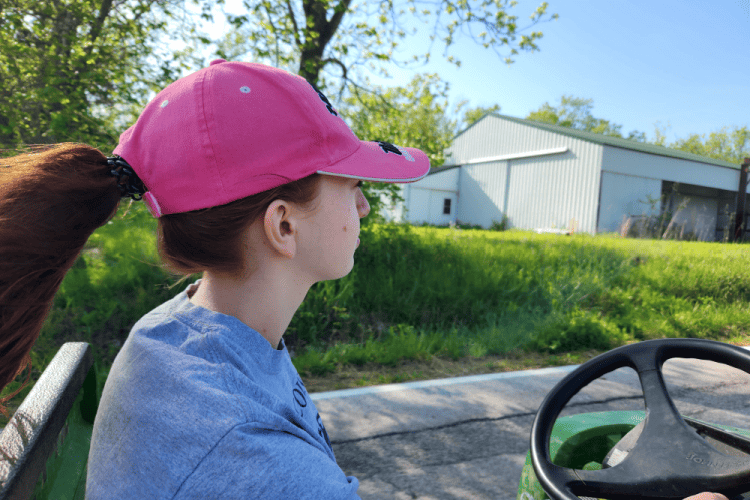
No one is going to ask you to jump in a tractor without training, but there are lots of little jobs that you will want to take notice such as:
- Does a particular gate swing in or swing out?
- How do you turn on the water?
- Where are some of the common work tools located?
- Which feed goes to which animal?
- How do certain gates latch?
- What is the best way to stack hay bales in a wagon (I’m still learning this one)?
Take the Initiative and Problem Solve
Now I get it, I like to stand back and watch a minute before I jump in to complete a task. I want to know the exact RIGHT way to do something first. But on the farm, you have to watch, learn, and jump in to help. If you hesitate too much or always wait for someone to tell you exactly what to do then you won’t be much help.
For example, on a farm there is a lot of backing up and hooking up to equipment. You may be told that the farmer is going to hook up to a wagon. In reality, the farmer may be backing up and hooking and unhooking to multiple wagons. So be on the lookout if the farmer starts backing up toward another wagon or trailer.
If the farmer is pulling a wagon through a gated area, then run ahead and open the gate. Keep an eye on what probably needs to be done next and anticipate as best as you can.
Be Aware of Farm Equipment
It is YOUR job to be aware of the big equipment that is moving around. Always assume that the person in the heavy operating equipment can NOT see you.
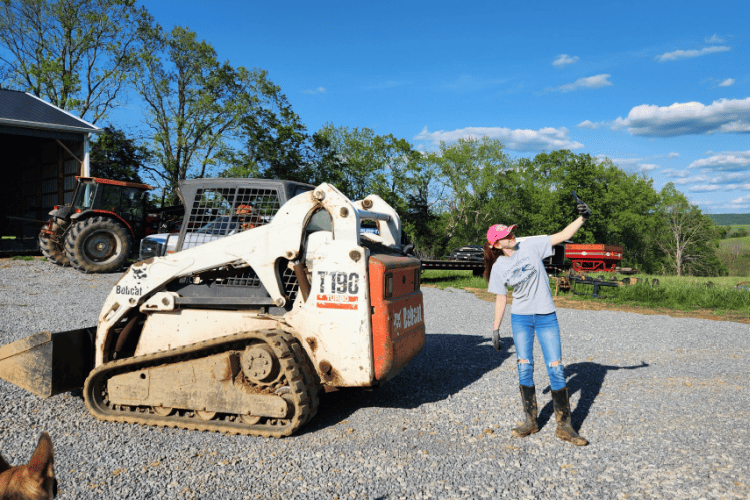
Yes, it is the equipment operator’s responsibility to safely run their equipment. But it is very hard for them to keep an eye on their dashboard, things in the field or road, keep track of the equipment they are pulling, plus be able to see behind their equipment.
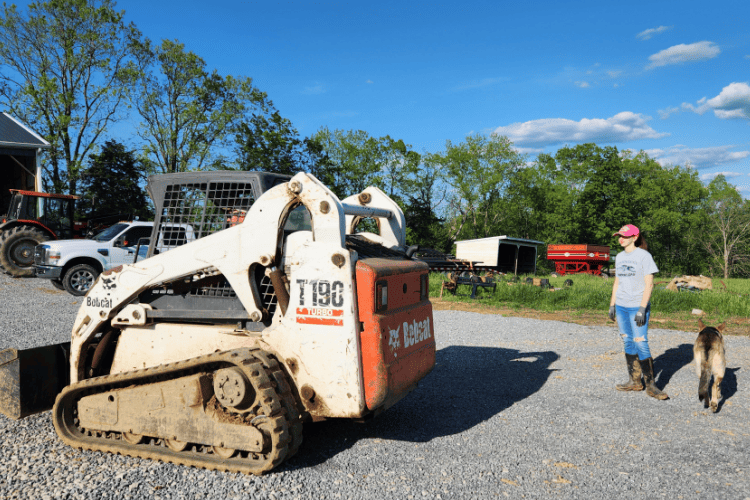
For your safety, assume that the driver does not see you and stay a clear distance away unless you are hooking or unhooking the equipment.
Use the Pole Side of the Fence to Cross
Typically, you want to open a gate, walk through it, and close the gate behind you. If you are in a hurry, you can climb up and over some fences.
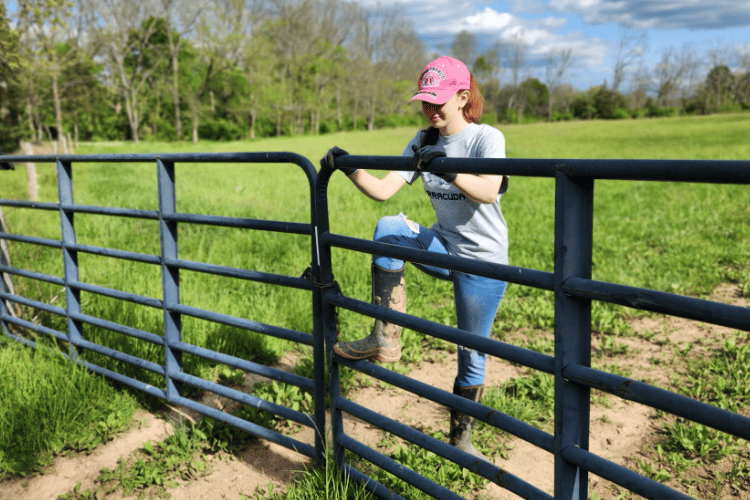
But make sure to always climb the side of the fence that is connected to a fence post that is in the ground.
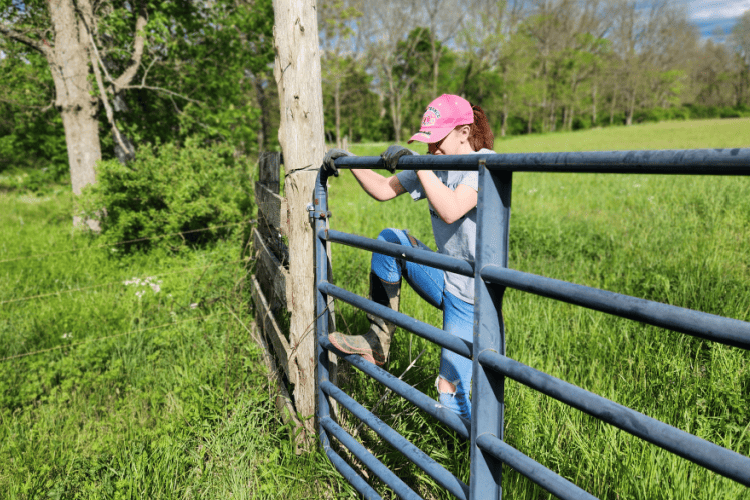
That way you are not putting all your weight on the middle of the fence that doesn’t have any support.
Your First Summer Farmhand Job – Gate Opener
One of your very first jobs as a summer farm hand will be to open and close gates. Being a gate opener is not very glamourous but opening gates IS very important. As a gate opener, you are saving the tractor or truck driver so much time as they are not having to get down out of their vehicle to open and close gates.
As a gate opener, you are also ensuring that the cattle stay inside the gate. Cows will often rush the gate when they see a farmer coming through with hay. By staying at the gate, you have the critical job of keeping the animals safely on the right side of the fence.
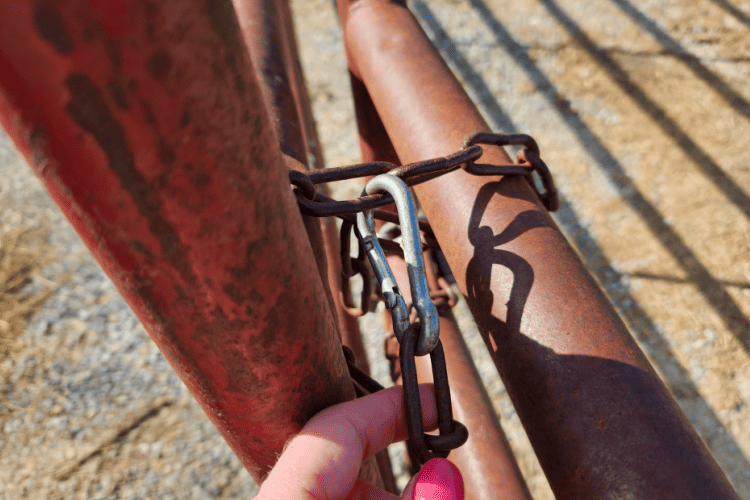
ALWAYS double check that the gate is latched. Cows don’t typically try to open a closed gated. But some farm animals are a little more crafty and will try to jimmy open an unsecured gate that is not completely latched. And I have seen a curious cow walk through an unsecured gate into a smaller fenced area only to block themselves into a field that did not have water (thankfully, we found them after several hours). Or worse the cows get out of the field and onto a road.
Learn to Unhook and Hook up Trailers
You can save a farmer or rancher tons of time if you unhook and hook up equipment for them.
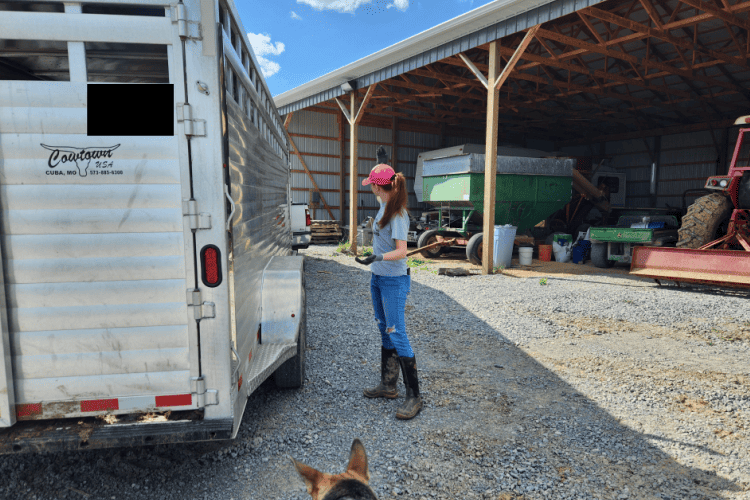
As a summer farmhand, learn how to back up equipment. For example, if you are helping a farmer back up a truck to a cattle trailer, you will stand over to the side of the truck , close to the trailer. You want to make sure that you can be seen in the truck’s side mirrors at all times to ensure that the truck driver can actually see you.
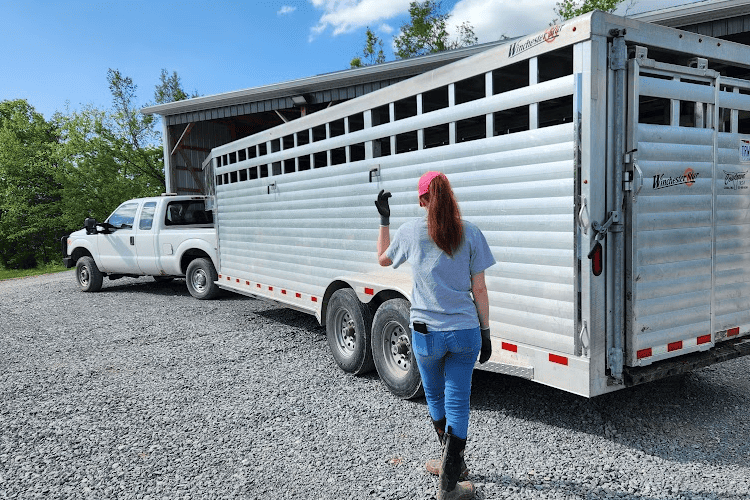
As a farm hand, you want to guide the truck back keeping an eye out so that the truck lines up with the trailer hitch without running into the trailer. When the truck is within a yard of the trailer, use your hands to show the distance between the truck hitch and the trailer to guide the farmer back into place.
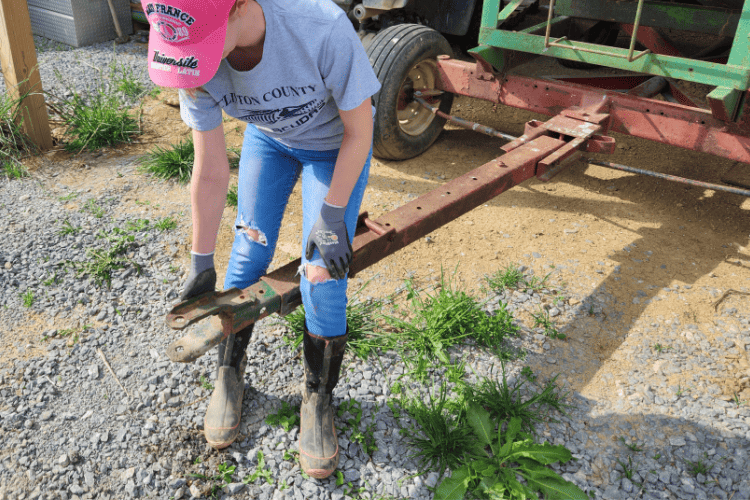
When unhooking equipment be careful to move your feet out of the way. Once you unhook a wagon (such as a grain or hay wagon) from a truck, the tongue will often drop. If your feet are in the way, the heavy wagon tongue may drop right on your feet. Be careful!
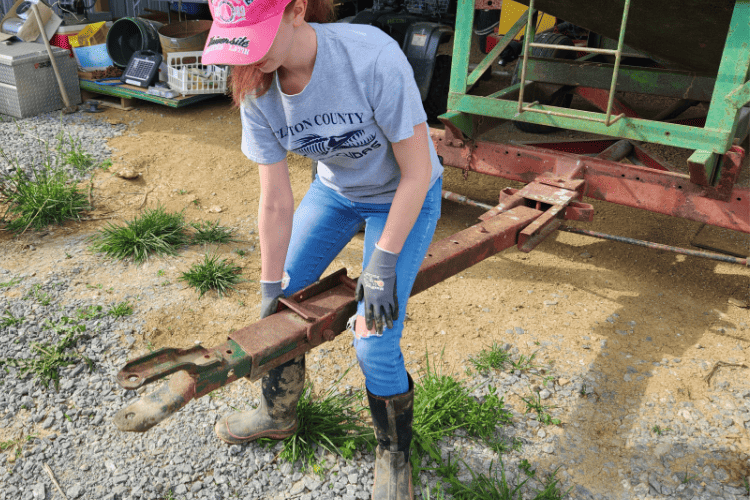
Double Check the Water As a New Farmhand
Most cattle farms have automatic waters. You may be asked to check waterers to make sure they still have water in them.
Most watering areas will have water around them from the cattle drinking, and their cow hooves making a muddy mess around the waterer. But if you see a ton of water around a waterer, alert the farmer. A waterer that is not working correctly can add up to hundreds of dollars in extra expenses.
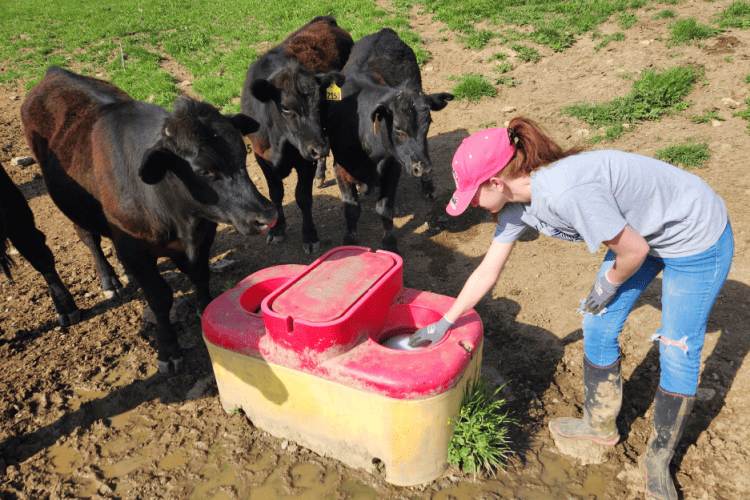
If you are asked to turn on a hose or outdoor faucet and fill a water trough, SET YOUR TIMER. There is nothing worse than turning on the faucet, walking off, and forgetting the faucet… until 3 am in the middle of the night.
Wear Jeans for First Summer Farmhand Job
You have probably seen pictures of cute farm girls wear cut-off jeans while baling hay. The reality is that most farm work is best done in jeans. Working with hay in shorts, all day, is a great way to slice up your legs for the week.
You can do some farm jobs in shorts, but for a safer bet, it is best to wear jeans.
Bring Water & Food for First Summer Farmhand Job
Unless you are told that the farm will be providing meals, you will want to bring plenty of water and a lunch for your first summer farmhand job. You will also want to eat a big breakfast as there is no set lunch time on the farm. There is a reason that there are jokes about a “farmer’s breakfast,” as the days are long on a farm, in summer.
Sometimes you are working long hours on the farm since you are racing to get hay in before a rain storm comes. Other times, the morning may start off slow with a piece of equipment breaking down, and then you are trying to catch up. So try to be prepared with some quick snacks, lunch, and plenty of water.
Invest in Work Gloves and Farm Boots
When you are starting out as a farmhand, you don’t want to go buy the most expensive boots and gloves. But you will want to make sure your feet and hands are protected.
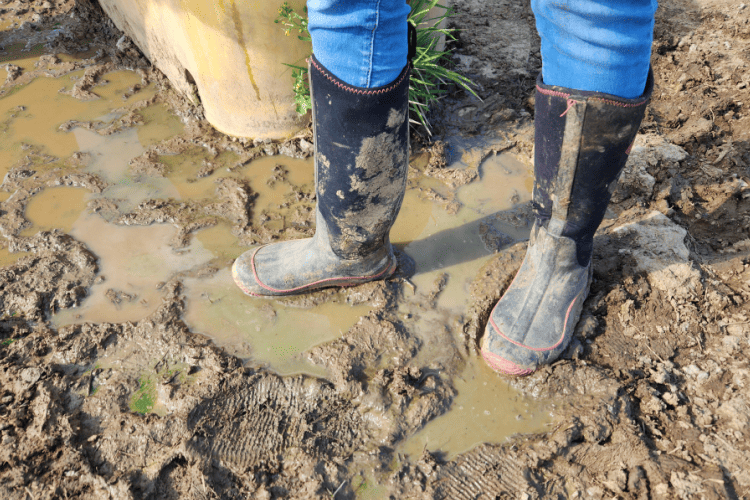
I love my muck boots as I can wear them spring, fall and winter. My muck boots protect my feet from cold, water, and deep mud! And now, I invested in cowboy boots. The cowboy boots are great for summertime, working hay, driving equipment, and checking cattle in dryer seasons. But cowboy boots do take some wear before they break in and are comfortable.
Athletic shoes will work starting out if that is all you have. But athletic shoes will get dirty fast and not protect that bottoms of your feet as well, against the rougher terrain. A pair of hiking boots will be heavier to wear but will protect your feet a little better for farm work.
Turn On Your Phone Volume
If you must have your phone with you, then make sure the call volume is turned all the way up. This is NOT so you won’t miss a phone call. Having the call volume all the way up is crucial on a farm or ranch if you happen to lose or drop your phone. There is nothing worse than searching for your phone in a huge field and you don’t have the ring volume turned up.
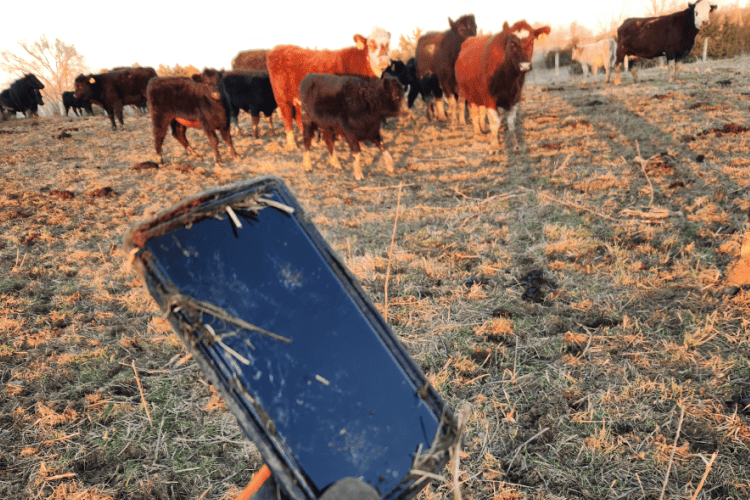
If you have a locator device on your phone, like Life 360, make sure that is activated, as that will help too. And don’t ask me how I know all this;)
Move Slowly Around Farm Animals As a Farm Worker
Livestock animals are used to humans, but they are unpredictable.
When working around livestock, be sure to listen when the farmer tells you where it is safe to be. During part of the season we have bulls in with our momma cows, and we give the bulls a wide berth. A farmer will also know which animals tend to kick or be more temperamental than the rest.
As a rule, you don’t want to reach your hand through a fence to pet a cow as your hand can get smashed if the cow suddenly raises their head.
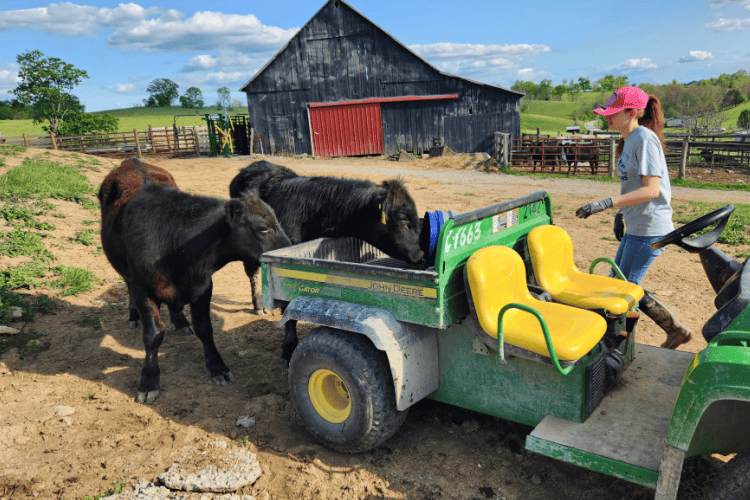
Move confidently but slowly around livestock. Cattle are cautious, so sudden movement, especially right behind them, can cause them to scare. And though cattle are usually very gentle, they also weigh 400-1200lbs, so when they move suddenly they can inadvertently hurt you if you are too close.
First Summer Farmhand Job Moving Cattle
Occasionally, you will have days when the livestock needs to be moved. Sometimes, cattle need to be moved to another field so they have better grass and the one field can rest and regrow. Other times, the vet may be coming to AI or to pregnancy check cows.
Moving cattle is a always a challenging job. Most cattle will fall in line and follow the crowd. But there will be a few who do not want to go or are so skittish that they won’t go where you want them to go.
Try to follow the farmer and other farm workers’ lead. You may be asked to stand in the gap in a field, with your hands out, guiding the cows in the right direction. Other times, you may be moving cows through the chute for the vet.
Again, be calm. Most of the time if all the other directions are blocked a cow will move where you want them to if you just give them a little time.
Farmhands Must Be Cautious Around Equipment
Farm accidents do happen. If you are a new farmhand, you will not be running equipment. But begin to watch how the lead farmhand or farmer handles equipment.
NEVER stick your hand into a piece of equipment that is still running. Most farm accidents happen when a farmer is in a rush and is trying to clear something from a piece of farm equipment without turning it off.
Also if you are baling hay, be careful to keep well-balanced as you don’t want to fall off the wagon while it is moving.
A Knife is an Essential Farm Tool
If you have a good pocket knife, it will be very handy around the farm. If you are working in the spring or in the fall, you will need a knife to cut strings or net off hay bales.
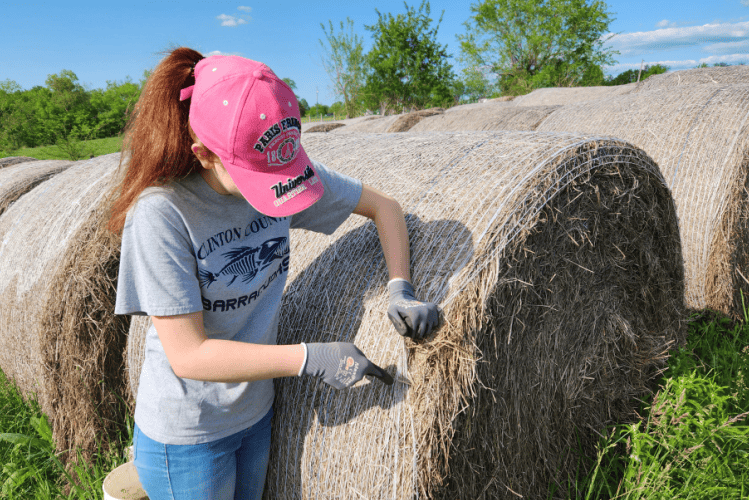
Knives can also be essential if an animal (or you:) gets tangled up in something.
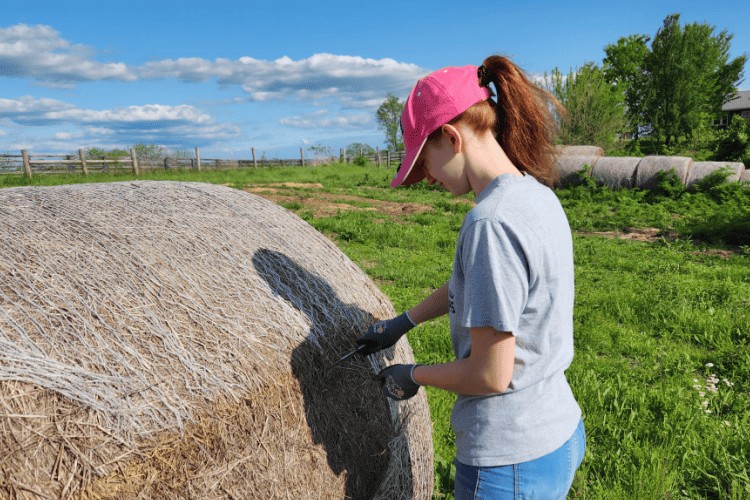
Always make sure to move the knife away from your body and not toward your body!
Manage Social Media for the Farm
A new job that has become more popular in the last 10 years, is social media. As more and more people live in the city, they are curious about farm life. Farmers have started making social media part of their farm management. This invites city folks to learn more about farm life and combats some of the misconceptions about farming. Social media also helps farmers gain support for their farm and their unique farm products.
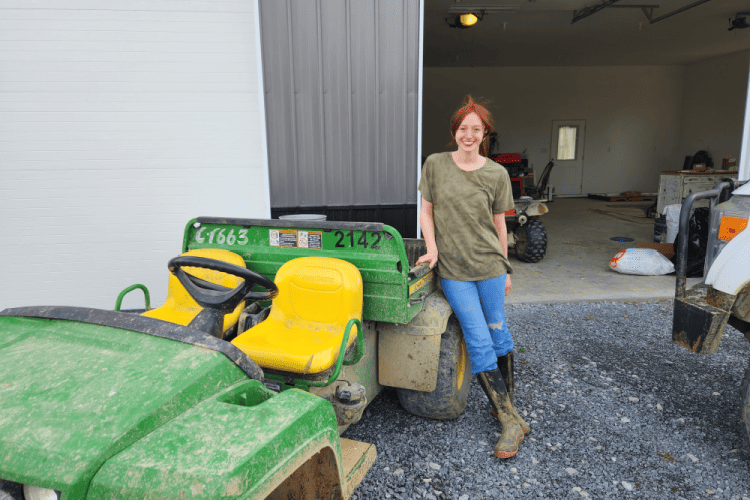
If you love farm life and social media, you can offer to take pictures of the farm life and/or post to social media. Helping with social media is a huge way to become more of the agricultural community!
What Skills Do You Need as a Farmer
There are so many skills you need as a farmer. Farmers and farmhands need to be able to problem solve, be flexible, have mechanical knowledge, physical stamina, and time management skills just to name a few. Most farmers also need to know how to run equipment. There is a huge variety of equipment in farming, but most farmers require tractors, skid-loaders, semi-trucks, trailers, and ATV’s. Farmers also need to know about their area of expertise.
If a farmer wants to focus on grain crops, they will need to know about planting, seed management, soil balancing, fertilize and weed management, harvesting, and contracting a good price for the grain. Grain farmers also must be knowledgeable about equipment as there is a lot of big machinery is modern day grain farming.
Farmers who want to focus on raising cattle need to know about hay and feed management, animal husbandry, equipment, buying and selling beef, fencing, and pasture management.
Farmers may jump from fixing equipment, to trying to pick out the best seed to grow in which field, to giving a sick calf a shot to sending off a soil sample to get tested, or posting an update on social media for farm fans.
Typical Farm Day Job Hours
There are no set hours on a farm. But typically work begins on a farm early.
If you have cows to be milked then it is done early in the morning and in the afternoon/ evening, depending on the farm.
For beef cattle farmers, there may be calves to check on several time of day during calving season in the fall or spring/ early summer. Growing and baling hay is a huge job during the summer, to raise enough hay to feed the cattle all winter. Mowing, baling, and storing hay can only be done on dry days. Cows need to be checked, most days, year around, rain or shine.
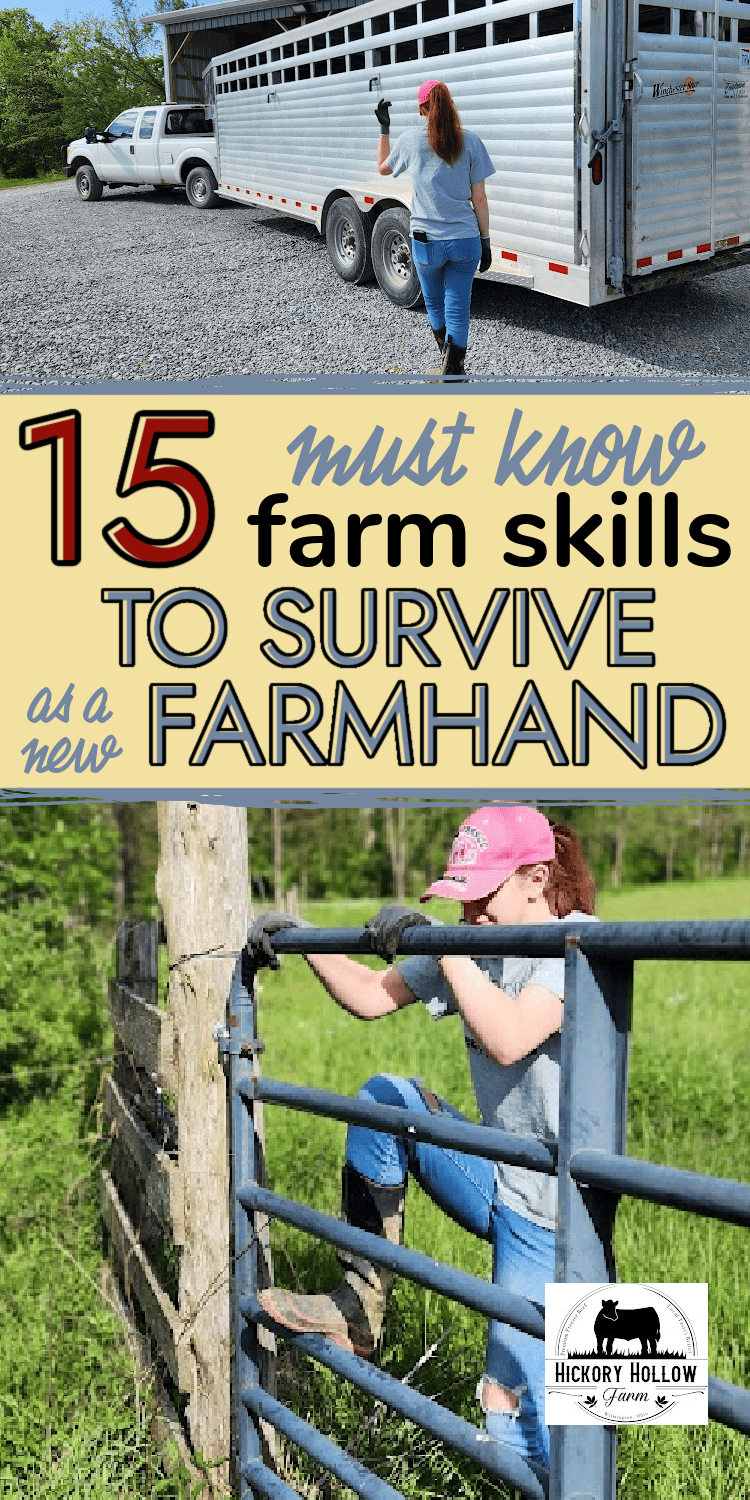
For grain farmers, there is a huge burst of activity in spring with tilling up fields and planting crops. If the weather is good, you may see tractors running way into the night in order to get all the crops in the ground. In the fall, there will be another surge of activity to harvest the crop and truck all the grain to the local mill or store in grain bins.
Summer Farmhand Jobs on a Farm
As mentioned, there are a lot of jobs happening on the farm in the summertime. On a cattle farm, the race is on in the summer to make and bale enough hay to feed the cattle all winter long.
If you are a summer farm hand on a grain farm, you may be needed to move equipment, run to get more seed for the planter, open gates, pick up a farmer and take him to another field, or clean equipment after use to get ready for harvest season.
As a summer farm worker on a berry farm, you may be asked to greet customers during u-pick days, trim berry plants, pull weeds, or pick berries.
There are so many jobs around a farm! Here is a list of summer farmhand jobs on a farm:
- Open and close gates
- Check waters or fill water troughs
- Drive farmer or other farm workers to another field
- Run into town to pick up supplies
- Carry food out to the field workers
- Hook and unhook equipement from truck and trailers
- Mow, tett or rake hay (experienced hand)
- Drive a tractor to pull hay wagons (experienced hand)
- Stack hay on a hay wagon
- Stack hay in a hay barn/ loft
- Check on animals
- Loading and moving animals
- Feed animals
- Mow grass
- Weed eat grass around fence line
- Pick berries
- Pull weeds
- Greet farm customers if there is a farm stand or market
- Manage social media by posting or taking pictures
Summer Outdoor Job for Teenagers
If you love rural farm life or just crave being outdoors, then a summer farmhand job is perfect for you. There is so much to be done on a farm. And farm work actually looks really good on a resume, as farm work takes initiative and hard work, so employees like to hire farm kids!
Each farm is unique in their focus so each farm life is a little different. However, there are some common farm skills that are good transferable skills such as caring for animals, opening gates, hooking up equipment, driving basic tractors, baling hay, thinking on your feet quickly, and working hard, Once you learn some basic skills, you can transfer those skills to the next farm or your next outdoor job.


